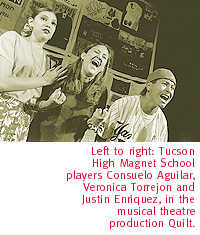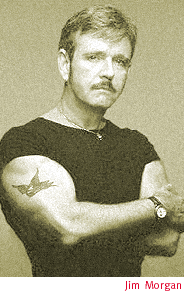
Acclaimed New York Playwright Jim Morgan Sings The Praises Of AIDS Survivors.
By Dave Irwin
WHEN THE STUDENTS of Tucson High Magnet School reprise
their successful March production of Quilt: A Musical Celebration
this weekend, there will be an added feature: an address by award-winning
playwright and lyricist Jim Morgan, who developed the work based
on a 32-panel section of the AIDS Memorial Quilt.
Quilt: A Musical Celebration (not to be confused with
Quilters, a musical about American womanhood being staged
later this month by UA Repertory) was a work born in personal
anguish.
 "It happened when I first saw the Quilt in 1987," Morgan
remembers via phone from his New York home. He's been an associate
professor at West Middlesex College since 1973. "It was the
first public showing of a very small quilt in Washington, although
it seemed big at the time--but nothing like it's turned into.
The energy was very intense, and I thought, 'This thing just sings
to me.' The idea was born there."
"It happened when I first saw the Quilt in 1987," Morgan
remembers via phone from his New York home. He's been an associate
professor at West Middlesex College since 1973. "It was the
first public showing of a very small quilt in Washington, although
it seemed big at the time--but nothing like it's turned into.
The energy was very intense, and I thought, 'This thing just sings
to me.' The idea was born there."
The AIDS Memorial Quilt now includes more than 80,000 names.
In its entirety, it weighs more than 53 tons and would cover more
than 25 football fields.
The musical evolved out of the numerous memorial services Morgan
found himself attending. He estimates he's lost 90 friends and
acquaintances to AIDS.
 "Basically AIDS destroyed my life as it was," he says.
"It must have been that way when the plague swept through
Europe. You either survived it or you didn't. It was devastating.
I lost everyone I knew, like dominoes. At one time I had nine
friends in different hospitals and three memorial services in
one week. It was destroying me and I didn't know it. I was beyond
depressed. And once they all died, I had to start a new life.
Quilt was part of the therapy, letting the old life go
and at the same time writing honestly about feelings. Everything
in the show is based on something real."
"Basically AIDS destroyed my life as it was," he says.
"It must have been that way when the plague swept through
Europe. You either survived it or you didn't. It was devastating.
I lost everyone I knew, like dominoes. At one time I had nine
friends in different hospitals and three memorial services in
one week. It was destroying me and I didn't know it. I was beyond
depressed. And once they all died, I had to start a new life.
Quilt was part of the therapy, letting the old life go
and at the same time writing honestly about feelings. Everything
in the show is based on something real."
The show was developed by Morgan, Merle Hubbard and John Schak,
with lyrics by Morgan and music by Michael Stockler.
"I tried not to write it," Morgan admits. "But
in New York, memorial services became an art form in the late
'80s and early '90s, there were so many of them. They stopped
being the usual gloomy thing. They were more spiritual. People
would tell stories or write poems about people, and they were
often very funny...This is the way it should be, people laughing
in church." Morgan started collecting all the things he'd
written for his friends' services; a couple of them make their
way into the show almost verbatim.
"Somebody who'd been to a number of these services said
they thought I had a show," Morgan recalls, "so I tried
to find a composer. I was turned down by 11 of them. Then Michael
Stockler came out of nowhere, and we started."
Tucson High drama instructor Art Almquist, who suggested the
project to his students, was sensitive to the potential for controversy.
Before proceeding, he got approvals from school and district officials,
who he says encouraged him not only on grounds that it was a valid
artistic work, but also educational in its handling of the reality
of AIDS and death. Rather than dwelling on who got AIDS and how,
it looks at the difficulties of dealing with the death of loved
ones.
"It's a show about survival," Morgan asserts. "It's
really about the people who made the panels and how they changed.
It's a celebration of life. As a musical, it's exactly planted
between a revue, which is a series of songs around a theme, and
a book musical. It has a story and there are several continuing
stories that interconnect. It has serious moments, comic moments
and dramatic moments. It's a fusion of all those things."
Quilt premiered in 1992 at the Smithsonian Institute,
under the auspices of the University of Maryland. Although it
hasn't been produced on Broadway, it's been a popular regional
production nationwide.
"This is not supposed to be expensive or complicated, so
it's deceptively simple looking," Morgan explains. "It's
a lot of people against black curtains. The people in the show
and the quilt panels provide the color. The writing is very layered;
very thick in that if you want to see the other layers, they're
there."
 Morgan has written other musicals and is a noted lyricist who
lists Stephen Sondheim, Jay Lerner and Irving Berlin as his influences.
His works are cited as textbook examples of clear and concise
composition in author Sheila Davis' three books on lyric writing.
He earned awards for lyric writing from ASCAP and the University
of Michigan.
Morgan has written other musicals and is a noted lyricist who
lists Stephen Sondheim, Jay Lerner and Irving Berlin as his influences.
His works are cited as textbook examples of clear and concise
composition in author Sheila Davis' three books on lyric writing.
He earned awards for lyric writing from ASCAP and the University
of Michigan.
In spite of his renewed successes, Morgan concedes that "it's
been hard getting a new life. You don't make friends as easily
at 50 as you do at 20. I have maybe three or four friends that
go back to the '60s and '70s. Everybody else is new."
Asked about the longevity of AIDS-related theatrical works, Morgan
says he believes Quilt will have staying power long after
a cure for the disease is found.
"The message is a cumulative message," he says. "It's
just about going on. You can't escape on your own, you have to
deal with it. It's about commitment, and how the commitment sometimes
has to change, to somebody else, to yourself, to a cause. We don't
grow unless we do that."
Quilt: A Musical Celebration, directed by Art Almquist
with musical director Todd Wachsman, plays at 7 p.m. Friday and
Saturday, June 11 and 12, in the Tucson High School Auditorium,
corner of Euclid Avenue and Sixth Street. Tickets are $7 general
admission, $5 for senior citizens and students. Advance tickets
are available at How Sweet It Was, 419 N. Fourth Ave., and the
Southern Arizona AIDS Foundation, 151 S. Tucson Blvd. For more
information, call 617-7549.

|





